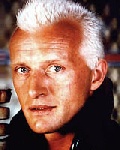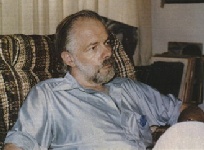Paul M. Sammon Interview
| What is BR? |
| News & Views |
| The FAQ |
| Encyclopedia |
| Quotes |
| People |
| Locations |
| Scripts |
| Analysis |
| Fan-tastic |
| BR Fun |
| BR Game |
| BR Magazine |
| BR Comic |
| Downloads |
| Collectibles |
| Related |
| Links |
| Site Info |
| Search Site |
BRmovie.com is the Home of Blade Runner - the current Blade Runner FAQ, news, resources, links, quotes, scripts and everything else Blade Runner.

![]()
Blade Runner
Buy this Mini Poster at AllPosters.com
|
Any
Comments?
Please e-mail the Webmaster |
| Want the DVD? Or the BR Game? Don't know which books or music to get? Maybe you'd like a Deckard action figure? Make sure you check the BR Related section for all your BR choices. |
|
N: In their background themes, how do you think book and film differ the most? And perhaps more significantly, despite the differences, how do you think the film eventually actually does convey some of PKD's prime themes? PS: I'm glad you mentioned the difference in background themes between Blade Runner and Sheep, too. Because, really, this was the most significant point of departure between the two works. Phil portrayed his "andys," or replicants, in Sheep as thinly disguised Nazis. Powerful humans who had absolutely no sense of empathy or emotional connection with what Lincoln called the better aspects of our nature. Therefore, Sheep's replicants were dangerous. Soulless things who were actually Phil's thinly veiled condemnation of what he perceived as an out-of-control culture drifting towards an increasingly selfish, soulless America. However, Ridley Scott viewed his replicants in a totally different light. His favorite phrase was that BR's reps were "supermen who couldn't fly," genuinely superior beings who were being ruthlessly manipulated by their genetic inferiors. That's a huge conceptual difference. And from what I recall, Phil never did agree with that divergence.
N: What was the relationship between Dick and Scott like? Was there a relationship? PS: Not really. I could be wrong on this, but I think Phil and Ridley only met once. Face-to-face, anyway. That was after Phil had seen the F/X reel EEG ran for him. Then Ridley showed Phil some BR storyboards and art, and Dick came away impressed by Scott's dedication and intelligence. Before that meeting, Phil had only been contacted by some lower-echelon BR production people, who'd phoned to tell him, among other things, that they didn't like the way he was bad-mouthing the project. You see, Phil had written an article for a local LA publication called Select TV Guide complaining about the quality of Hampton's first two BR script drafts. He hadn't liked those, to put it mildly. Then they'd told him to stop using the word "android", and basically brushed him off. That pissed him off.
I think Ridley mostly did this as a courtesy, by the way. Not just as a PR move. And let's face it - Ridley didn't have to make contact with Phil. Not at all. Dick may have written Blade Runner's source novel, but Phil had had absolutely nothing to do the adaptation of that novel. Dick hadn't written BR's script, Dick hadn't acted as a technical advisor on the film, and Dick had had nothing but bad things to say about Hollywood. So it would have been very easy for Ridley to respond with, "Who is this nut? Tell him to piss off. Let's get on with it." But he didn't. Ridley was courteous enough to arrange something very special for Phil; a LOT of people hadn't seen as much of Blade Runner as Phil Dick did that day. And those people had actually worked on the movie!
|

 What's
really crazy about their differing points of view, though, was how,
at the end of the day, Phil generally agreed with how Hampton
and David and Ridley had adapted his book. I specifically asked
Dick about this point just a few weeks before he died, in fact.
Unfortunately, this was one of the few conversations I didn't tape-record.
So I'm going to have to paraphrase here. But what Dick more or less
told me was, "Once I saw Rutger Hauer in the test footage and
saw how they'd made him look like a perfect Aryan, I realized the
people behind Blade Runner knew what I was trying to get
at in Sheep. I also saw a decaying metropolis that was falling
apart because of humanity's arrogance, and I saw a society where
the very nature of the human soul was imperiled because of that
arrogance. That's pretty close to what I was saying in Sheep."
What's
really crazy about their differing points of view, though, was how,
at the end of the day, Phil generally agreed with how Hampton
and David and Ridley had adapted his book. I specifically asked
Dick about this point just a few weeks before he died, in fact.
Unfortunately, this was one of the few conversations I didn't tape-record.
So I'm going to have to paraphrase here. But what Dick more or less
told me was, "Once I saw Rutger Hauer in the test footage and
saw how they'd made him look like a perfect Aryan, I realized the
people behind Blade Runner knew what I was trying to get
at in Sheep. I also saw a decaying metropolis that was falling
apart because of humanity's arrogance, and I saw a society where
the very nature of the human soul was imperiled because of that
arrogance. That's pretty close to what I was saying in Sheep." Now,
Dick was already upset that no one from the production or studio
had ever called him to let him know that Sheep was being
adapted into a film in the first place. So when he finally does
gets a call from the production company, and it's a chastising one,
well, that was like dropping a road flare into a barrel of napalm.
Meanwhile, Ridley was basically ignoring all this - after all, he
had a film to make. But I guess Phil started making so much negative
noise about the picture that when Ridley finally hit post-production
and had a little breathing room, he felt he'd better deal with this
issue. So the production invited Dick to the screening of what's
called a "red dot reel".
Now,
Dick was already upset that no one from the production or studio
had ever called him to let him know that Sheep was being
adapted into a film in the first place. So when he finally does
gets a call from the production company, and it's a chastising one,
well, that was like dropping a road flare into a barrel of napalm.
Meanwhile, Ridley was basically ignoring all this - after all, he
had a film to make. But I guess Phil started making so much negative
noise about the picture that when Ridley finally hit post-production
and had a little breathing room, he felt he'd better deal with this
issue. So the production invited Dick to the screening of what's
called a "red dot reel".